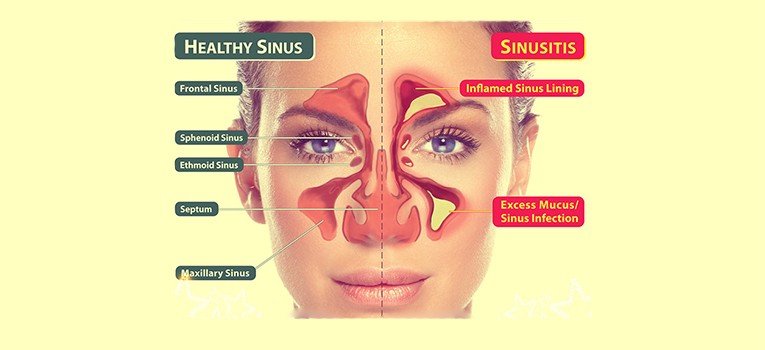Sinusitis, as most readers of this post know, is an inflamed condition of the sinus tissues. However, Sinusitis is often confused with rhinitis, which is a medical term used to describe inflammation and irritation of the nasal passage. When sinuses are infected and blocked, they get filled with fluid and other bacterial elements. This annoying health condition generally follows cold, allergy, a nose polyp, fever or a combination of these.
The different types of sinus infections that afflict patients can be:
Severe sinus infections accompanied by a runny nose, headaches or pain which can last up to a month.
Moderate sinus infections may just cause an inflammation in the sinus tissues lasting for one or two months.
.Chronic or recurrent sinus infections will display symptoms described above but generally last for more than eight weeks. These sinus attacks can occur several times throughout the year and last more than eight weeks at a time.
According to American College of Allergy, Asthma, and Immunology the five common symptoms of this disease include:
Yellowish or greenish nasal discharge: The colored discharge is generally thick and smelly and sometimes accompanied with a little blood.
Nasal congestion with fluid: Sinusitis generally causes blocked noses.
Swelling or pouches under the eyes or around the nose: The facial swelling and pain are highly indicative of a sinus infection.
Acute headaches: Sinusitis will generally cause painful headaches and facial heaviness.
Bad breath: The most accurate symptom of a sinus infection is bad breath.
The other symptoms that may accompany are headaches, fever or toothaches. Dust allergies or Asthma can often lead to chronic sinus infections. Generally, people suffering from any types of dust allergy or asthma will develop long-standing nasal inflammation, which in turn, can lead to a chronic sinus condition.
When to See the Doctor
If the colored discharge from the nose does not clear up in one week, and the symptoms continue to get worse, sometimes causing fever and facial pain, then this is a good time to visit the doctor for further consultation. The doctor will generally diagnose a sinus condition with the appropriate tests of the nose, throat, and sinus regions.
- The common symptoms that the doctor will try to look for are:
- Swelling of the nasal tissues
- Swelling or pouches under the eyes or around the nose
- Discolored nasal discharge
- Bad Breath
Frequency and severity of headaches
The home remedies for a sinus condition can include different methods like benzene inhalation, allergy treatment, but the most effective method for treating chronic sinusitis involves medical treatment and surgical procedures. You can find useful information about sinus treatment methods in this Neoalta blog post: Types of Sinus Surgery.




